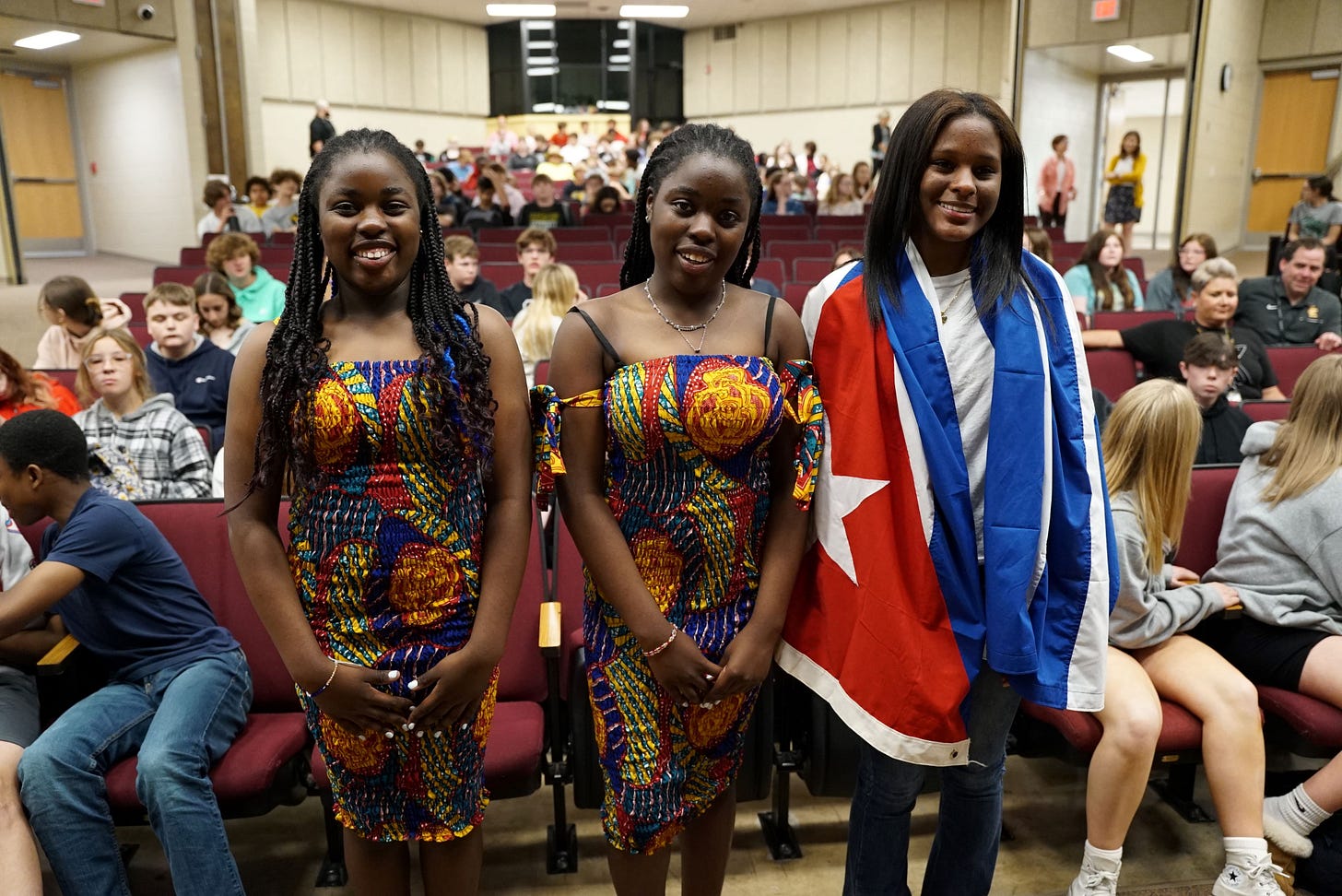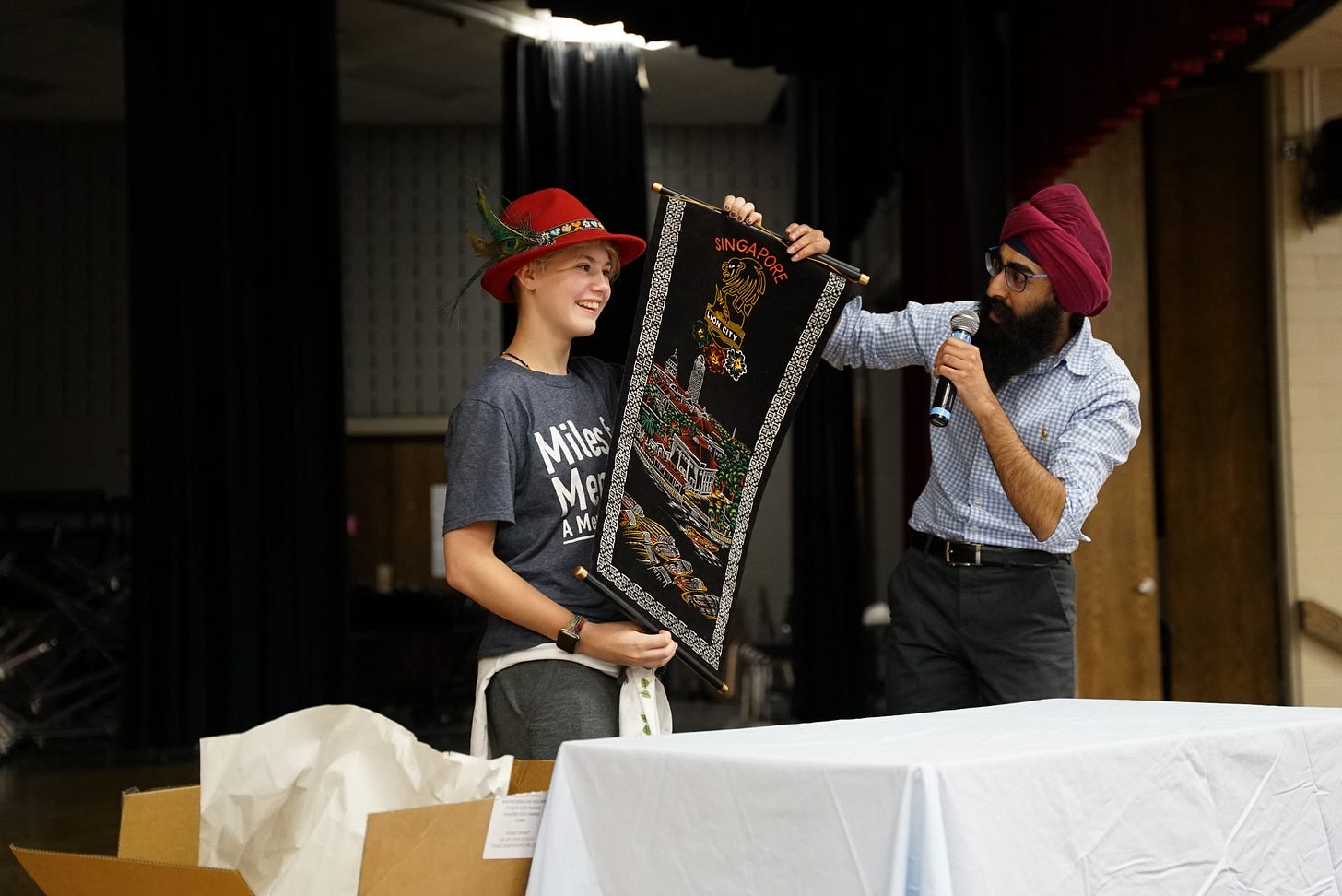How a Student's Mistake Taught Me About Inclusion
A misspeak leads to a lesson on empathy and forgiveness
The Midwest Creative is a passion project borne out of my love for my home and my sincere belief that the Midwest deserves our love, care, and investment. I will sing the praises of the creative community in this region until my last breath. But I need your help to reach as many people as I can.
If you enjoy my work, I would be honored if you could give it a like and share it with your community. Your praise helps me reach even more artists and to create a deeper, more connected community. Upgrading your subscription to paid will provide me with the resources to lift up creatives and they’re important work across the Midwest. I appreciate your support in any shape or form.
I sat on the steps in front of the auditorium stage at Southeast Polk Middle School with my camera focused on CultureALL AmeriCorps Fellow JJ Kapur. He was finishing up his presentation on “What is Culture?” and offering strategies for students to learn about cultures different from their own. Most of all, he wanted students to know: “Don’t be afraid to ask.”
The audience of 8th grade students tossed questions to him.
“What do you like to eat for breakfast?”
“Where is your favorite place you’ve traveled?”
“What holidays do you celebrate?
I watched as JJ gestured toward his head. As a Sikh American, he wanted the students to ask about the turban he wore to signify his faith. “Ask me about this!” he exclaimed. Sensing the students didn’t understand what he meant, I prepared to ask the question myself and help him make his point.
Instead, JJ pointed to a boy in the middle of the audience with his hand high.
“I just think your turban is really cool,” said the boy, whom I will refer to as Timothy. “Because honestly, and I don’t mean this in any bad way, but I think you look like a Call of Duty character.”
The air sucked out of the room. I felt my stomach drop, immediately understanding that the child was comparing him to a terrorist character in the famous war simulation video game.
JJ slightly chuckled.
“Does anyone else have a question about my appearance?” he said.
Don’t Be Afraid to Ask
JJ arrived at Southeast Polk Middle School that day to help the students understand what culture is and how to talk about it. He shared two boxes filled with mementos from his life, explaining through his presentation that each of us, no matter where and how we grew up, have different objects, traditions, and beliefs that make us who we are.
“The major takeaway I wanted from that presentation is that the only way to find out about someone's culture is to ask them, and to ask them respectfully,” he later told me.
Most Iowans live in the same county where they were born. They often don’t have the chance to connect with people who look, behave, and believe differently from them. The lack of opportunity to interact with other cultures leaves many lacking the skill to connect across differences.
JJ hoped to build a space at this school assembly where students could develop those important skills through healthy communication.
When the student connected JJ’s appearance to terrorism, it seemed that the space JJ had built was crashing down. But instead, JJ used it as an opportunity to share how empathy and forgiveness are vital to building a truly inclusive community.
“When I looked at the situation, I understood Timothy’s intention, which he had made clear,” JJ said. “He was saying, ‘Hey, I just play a lot of Call of Duty.' In that moment, I understood it was him trying to connect with me. To be honest, I used to play a lot of Call of Duty too. In that moment, I had empathy for him.”
Labels Harm Everyone
As the students filed out of the auditorium, JJ and I started to pack up. I congratulated him on an impactful presentation as a teacher walked up to us.
“If you have a moment, I’d like Timothy to come and apologize to you,” the teacher said to JJ.
As she left to find Timothy, JJ and I exchanged a knowing look. Would this kid be embarrassed? Would he be angry at his teacher for making him come back? Will JJ receive a heartfelt apology, or will Timothy just say whatever the teacher expects of him?
Regardless of what we were expecting, we began to understand Timothy a little better after another teacher came over to share her thoughts.
“That’s what really flipped the switch for me,” JJ explained to me later. “All the teachers know this kid and he’s a 'trouble-maker.’ He had been labeled and stereotyped probably just as much as me.”
Timothy walked back into the auditorium with the first teacher a few minutes later. I watched as JJ walked up the aisle to meet them. I immediately noticed how calm and composed both the teacher and student seemed. JJ shook Timothy’s hand.
“Man, I didn’t mean to offend you or your religion,” Timothy said, eyes fixed on the ground. “The character just came to mind, and I’m sorry that I offended you.”
“Hey man, that’s really good to know. I appreciate you saying that to me,” JJ responded. They chatted about the assembly, and Timothy mentioned that he had heard his classmates making offensive comments about JJ’s religion during the presentation.
“Well, you know what sets you apart from those kids?” JJ asked him. “You actually said it to my face, and even though you messed up, at least you asked the question. Then you were able to come back to me to apologize. That’s what means the most.”
JJ wished Timothy and his teacher a great afternoon, and we continued to pack our things. I later told JJ that he handled the entire situation with much more grace than I thought I could have.
“I go back to what [Open Book] Lilian Okech said once, which is that, ‘it’s my responsibility to teach you how to love me,’” JJ responded. I saw what he meant. In this situation, JJ let Timothy know that his perception caused harm but also shared how he could learn from that mistake and do better moving forward. “There was a willingness I saw in Timothy to come back to the table to talk with me about it. And that made me want to forgive. We all hold that responsibility. I have to teach you how to respect me.”

JJ went on to explain his belief that when we choose to avoid tough conversations out of a fear of offending, we lose out on the chance to build new understanding and learn other people’s perspectives. Our world narrows and the dynamic, engaging relationships we could have built are no longer possible.
When we engage in ways that leave space for mistakes, we open up a world of opportunities to grow as human beings and build a more inclusive world.
“The fear of offending is the biggest thing holding us back from healthy, constructive dialogue across differences. We can quell that fear by realizing we will always make mistakes; we will never be perfect,” JJ said. “What really matters is what we do after the mistake. We are bound to offend others because we don't know their full stories. The job is to figure out how we create spaces where we can invite those stories in.”
This piece was originally published on CultureALL’s blog.
The ultimate goal of CultureALL is to elevate individuals' behaviors and attitudes to a higher level of acceptance and collaboration for the benefit of our region. We do this through authentic, multicultural experiences that lead to a greater appreciation of diversity. We also work with businesses and corporations on their DEI planning to promote inclusivity within the workplace. If you are in need of cultural education or support in your DEI journey, please contact us a Explore@CultureALL.org.
The Midwest Creative is a proud member of the Iowa Writers Collaborative. Please consider a subscription to my colleagues’ work to support storytelling across the state of Iowa. All of these authors provide content for free, with paid subscription options. Pick one or more, and help sustain this movement.







Very powerful story!
I enjoyed this story very much. I love the work CultureALL and its ambassadors are doing in the schools!